Imagine coming home after a day of skiing. You’re tired. Traffic is heavy. You’re doing your best to keep your eyes on the road. Suddenly, someone cuts in front of you. You slam on the brakes. Nothing happens …
Or maybe you’re driving through the neighborhood. Your mind is on a problem at work, stopping by the grocery store on the way home, your plans for the weekend. A ball rolls in front of you. A child runs out from behind a car. You stomp on the brake pedal. Nothing happens …
Wild stories? Not in the least. As you read each of them, you probably felt just how real each of them could be.
At the bottom of each is a problem with the car. When you drive on worn brakes, you might lose control. You might not be able to control your vehicle as intended. And in each of the cases mentioned above, it can lead to scary, disastrous results.
Driving on worn brakes will lead to expensive repair bills and replacement of other car components. Brake pads are crucial to the brake system, but they aren’t the only part. When you allow one part to deteriorate, it leads to damage in other parts of the car. Brake pads may not be the only part that can impact your drive, but they are the most noticeable as they begin to wear down.
How can you tell if your brake pads are worn?
With all major components and systems of your car, there are built in warning systems to alert you to potential problems before they occur. Watch for these things, sure signs your brakes are worn down.
Noise – Brake pads have a built in noise indicator to alert you to when the pad is wearing down. You can’t ignore the screeching sound worn brake pads make. This isn’t something that’ll go away. It continues to get worse the more worn the brake pads become. It does give you ample time to connect with your mechanic and get your car in for servicing.
Vibrations – Sometimes you can feel the problem. If damage to the brake pads has impacted the rotors, you’ll feel a slight vibration every time you press down on the brake pedal. Full connection between the various components isn’t taking place, and you’re at risk of not being able to stop effectively when pressing down on the brakes.
Soft pedal – Instead of feeling a vibration when you press down on the brake pedal, it might take more pressure to accomplish the same brake function. People often define worn down brakes as acting like a sponge – there’s little resistance as you apply pressure to the brake pedal. That lack of tension is a sign your brakes need replacing.
Slow response – Over time, your brake system might not respond in the same manner as it did when you first purchased your vehicle. Pay attention to the changes. If you notice you’re having to push down farther on the brake pedal, it takes you longer to come to a complete stop at a traffic light, or you have narrow misses because of a longer stopping range, it’s time to bring your vehicle in for inspection.
What happens when you drive on worn brakes
You’ve determined your brake pads are worn. You know you have a problem that needs to be fixed. But you have places to go, things to do. Maybe next week …
What can happen if you continue to drive on worn brakes?
You might damage the brake rotors and calipers
While brake pads might be the most common repair item on a vehicle’s brake system, there are many other components that make it function. If your brake pads continue to wear down, they will eventually impact other components of your vehicle.
As the brake pads wear past the wear mark, they may not have enough material left to get the job done. That can impact the brake rotors, damaging them as well. As you brake, the brake pads press against the brake rotors to slow and stop your car. If the pads are excessively worn, this produces a metal on metal grind, which damages the rotors.
This can also cause excessive heat, especially if you’re driving long distances or applying your brakes more than usual, such as coming down from the mountains. Worn pads squeezing the rotor can also warp and crack it. Brake rotors are designed to last longer than brake pads, but not if they are damaged in the process.
It can wear down your tires
Another component that can be impacted by worn down brakes are your tires.
As you drive on worn out brake pads, it takes more energy to bring your vehicle to a stop. That means you’re more likely to slam on the brakes more frequently as you avoid potentially harmful situations.
Excessive braking will cause your tires to wear out faster due to the higher impact of jolting to a stop. They may need more balancing, or possibly have uneven tire wear.
Don’t ignore potential brake problems
Having your brakes checked regularly should be considered routine maintenance. Don’t ignore them. If you put off a warning sign today, it will lead to further damage and higher repair bills in the near future.
Your brakes are one of the most important safety components of your vehicle. Have a professional check it out and repair it as quickly as possible at the first sign of a brake issue.
With today’s vehicles, technology can alert you to problems long before they grow. If you notice the brake light on your dashboard illuminate, use that as an indicator it’s time to make an appointment.
You should also pay attention to your drive. Even if you don’t notice a vibration in your brake pedal, or a noise when you step on the brake pedal, as a regular driver, you can feel when something is wrong.
If your car pulls to one side or the other as you brake, it’s an indication of a problem. If you hear a strange sound, smell an out of the ordinary odor, or see fluid underneath your vehicle as you pull away, those are all good indicators of an issue with your car.
Let one of our trained mechanics inspect it and find out what’s wrong.
We’ll have you on the road again in no time, safely.

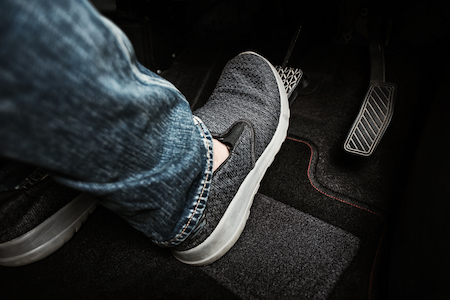
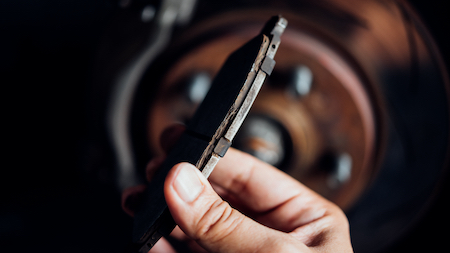
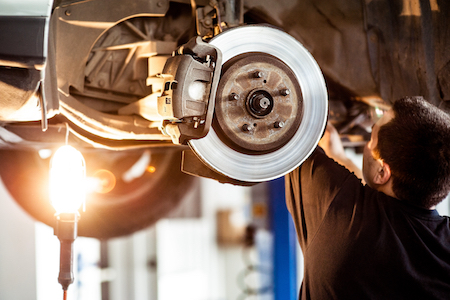 While these are the main components of the braking system, there are many more parts that go into making up each individual component. If any of these parts wear down, break, or leak, it can put your braking system in jeopardy.
While these are the main components of the braking system, there are many more parts that go into making up each individual component. If any of these parts wear down, break, or leak, it can put your braking system in jeopardy.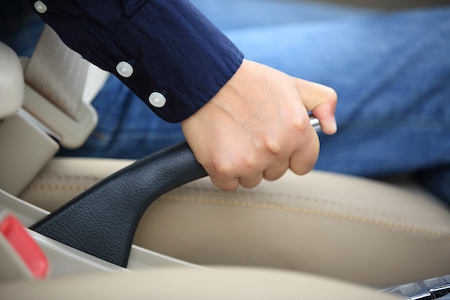 Your vehicle’s brakes are designed to bring your car to a stop. The more pressure you apply to the brake pedal, the more tension is transferred from the brake pad to the wheel, slowing your car until it eventually stops.
Your vehicle’s brakes are designed to bring your car to a stop. The more pressure you apply to the brake pedal, the more tension is transferred from the brake pad to the wheel, slowing your car until it eventually stops.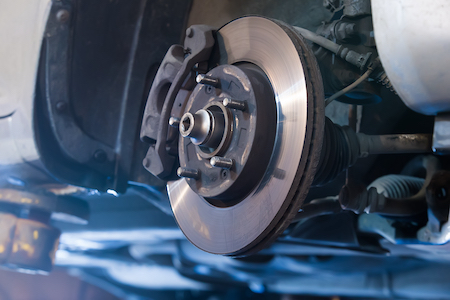 ABS icon lights up
ABS icon lights up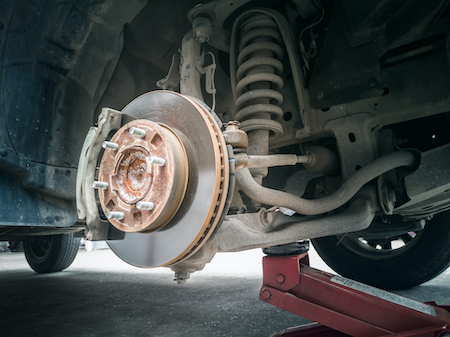 A small pickup will have gross weight of anywhere from 5,000 to 7,000 pounds. If you have a heavy duty pickup, gross weight can move up to 7,000 to 12,000 pounds. While manufacturer specs are needed to properly define actual weight, in any case you move a lot of mass around every time you sit behind the wheel.
A small pickup will have gross weight of anywhere from 5,000 to 7,000 pounds. If you have a heavy duty pickup, gross weight can move up to 7,000 to 12,000 pounds. While manufacturer specs are needed to properly define actual weight, in any case you move a lot of mass around every time you sit behind the wheel.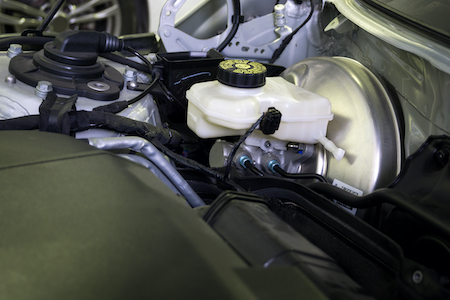 The brake system moves into action as you step on the brake pedal. Through hydraulics, the force of the brake pedal moves pressurized brake fluid through the line, down into the caliper. The caliper then squeezes the
The brake system moves into action as you step on the brake pedal. Through hydraulics, the force of the brake pedal moves pressurized brake fluid through the line, down into the caliper. The caliper then squeezes the 
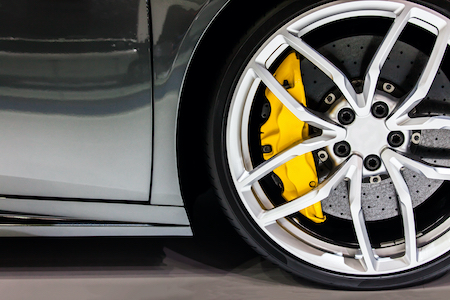 With a disc brake system, a disc turns the wheel. The disc is straddled by a brake caliper, which is controlled by pistons operating from the master cylinder. These pistons press against brake pads that case friction and stop the vehicle. These pads are shaped to cover a significant portion of the rotor, to ensure it properly stops the car.
With a disc brake system, a disc turns the wheel. The disc is straddled by a brake caliper, which is controlled by pistons operating from the master cylinder. These pistons press against brake pads that case friction and stop the vehicle. These pads are shaped to cover a significant portion of the rotor, to ensure it properly stops the car.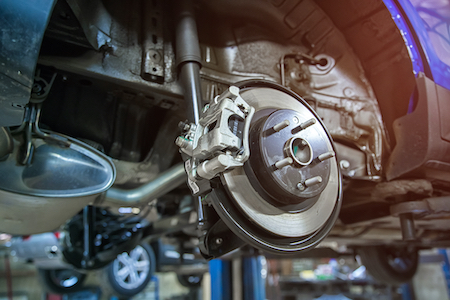 Disc thickness variation, or DTV, can be caused by different factors. It’s a mechanical term used to describe when the rotors have different thickness levels, and have worn unevenly over time. It can be caused by sticking calipers, rust, dirt and debris clinging to various parts of the pad and the rotor, or from slamming on the brakes frequently. When this thickness level is different, the brake pads will have to press against the rotor at varying degrees of friction. The rotors will have flat spots, meaning the brake pads will connect at different ratios. This will eventually cause one to wear down faster than the other.
Disc thickness variation, or DTV, can be caused by different factors. It’s a mechanical term used to describe when the rotors have different thickness levels, and have worn unevenly over time. It can be caused by sticking calipers, rust, dirt and debris clinging to various parts of the pad and the rotor, or from slamming on the brakes frequently. When this thickness level is different, the brake pads will have to press against the rotor at varying degrees of friction. The rotors will have flat spots, meaning the brake pads will connect at different ratios. This will eventually cause one to wear down faster than the other.